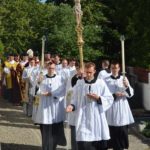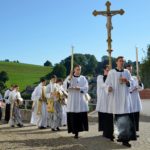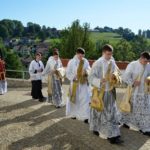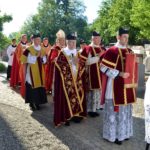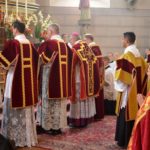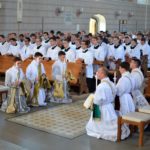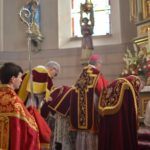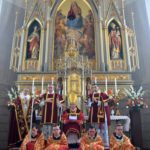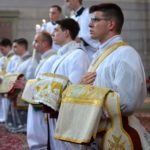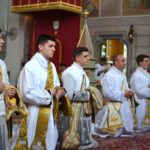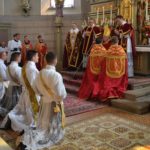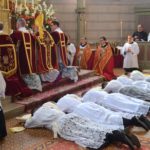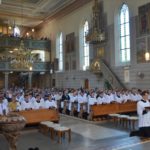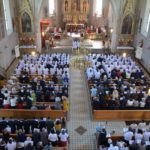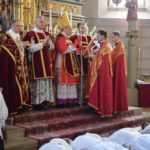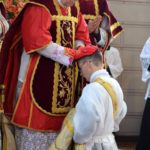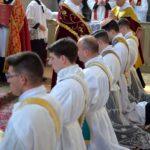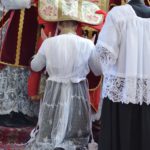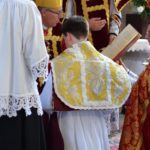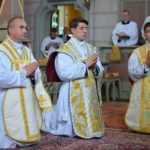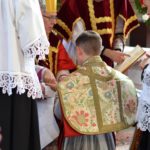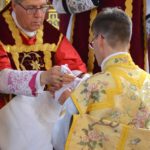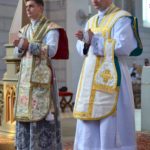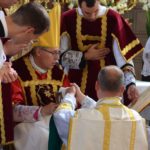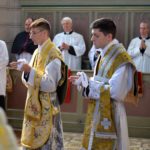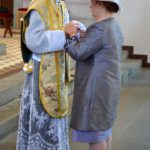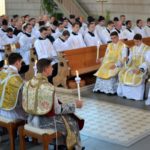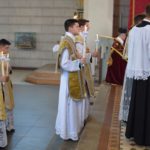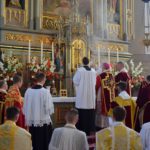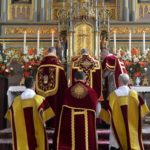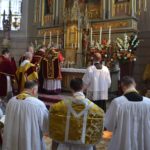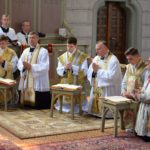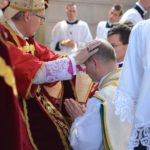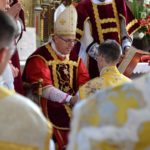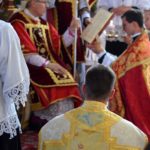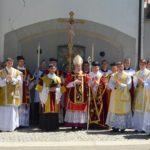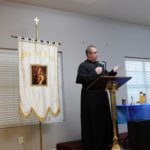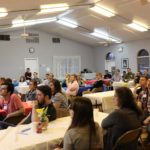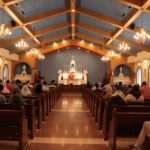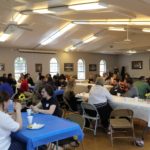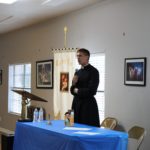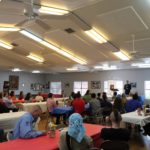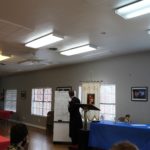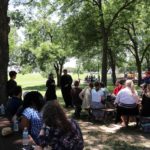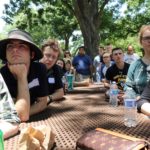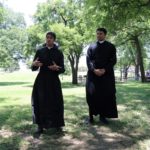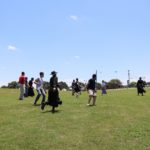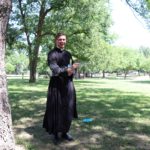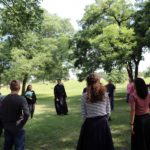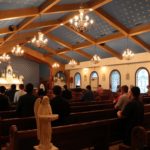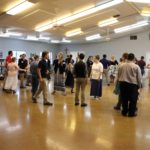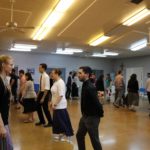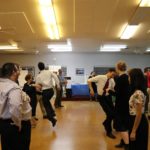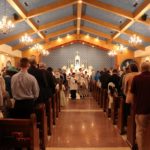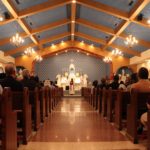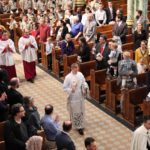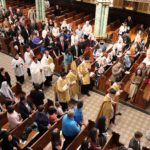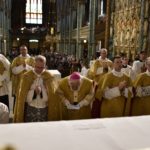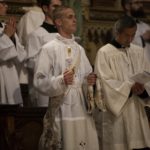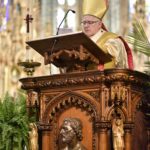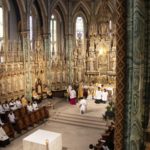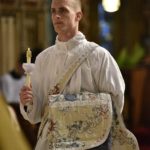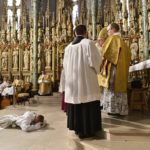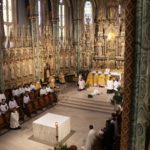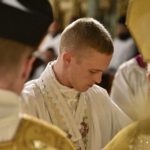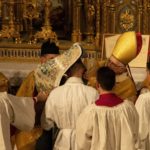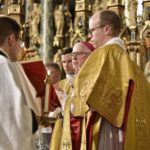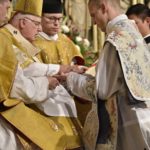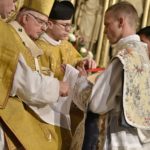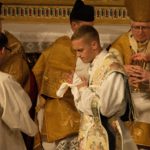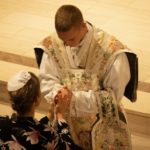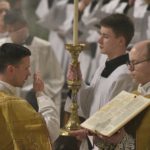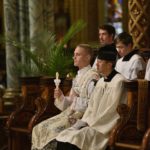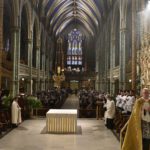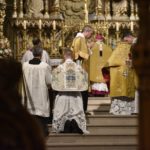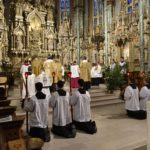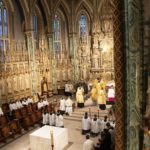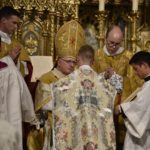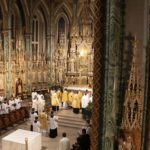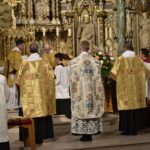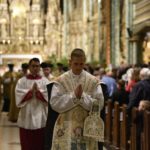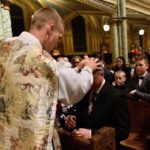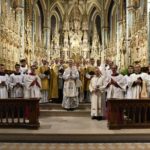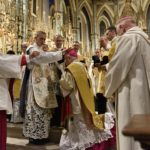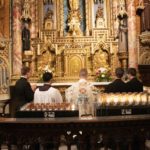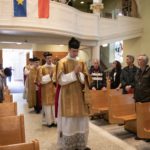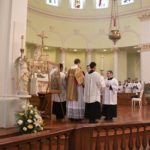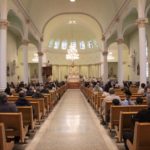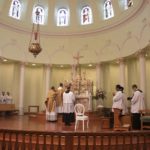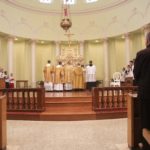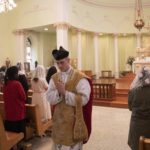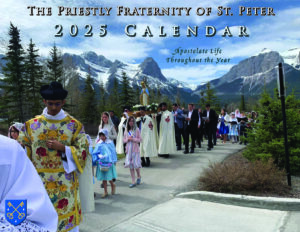St. Mary’s Church on Broadway Celebrates 150 Years
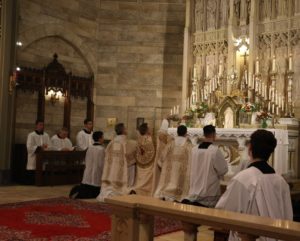
Today, July 11th, 2019, St. Mary’s Church on Broadway, home of FSSP Providence, celebrates its 150th anniversary! This magnificent church, dedicated on July 11th, 1869 by Bishop Francis McFarland, became a Fraternity apostolate last summer when Bishop Thomas Tobin invited the FSSP to assume administration. The parish will celebrate their milestone anniversary with a Solemn High Mass this evening at 6:30 p.m., followed by refreshments and live Irish music. If you’re in town, be sure to join them!
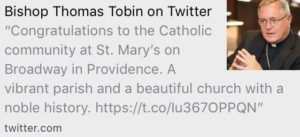
The Rhode Island Catholic put out a splendid article today for the anniversary of the church. The story touches on the history of St. Mary’s and how the FSSP views its assignment here: as a mission to continue the work and sacrifices that generations of parishioners have dedicated to their beautiful church.
“From the beginning the current community has felt a great connection with the past history of St. Mary’s,” said pastor Fr. John Berg, as quoted in the article. “The church itself speaks constantly to us of its history and the sacrifices made . . . It was clear to us from the start that we inherited something which others had sacrificed a great deal for and now it was up to us to care for and give life to this historical edifice.”
Read the full story here! +
July 11, 2019

FSSP Harrisburg Featured in Diocesan Publication
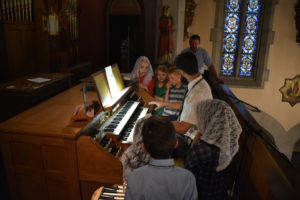
Mater Dei Latin Mass Community, our apostolate in Harrisburg, Pennsylvania, was recently featured as the cover story in the July 5th edition of The Catholic Witness, the newspaper of the Diocese of Harrisburg. The story covers Mater Dei’s recent chant camp in June, which brought together young people for classes that covered such topics as chant technique, notation and history and culminated in a Solemn High Mass where the campers tried out their new skills.
“The sacred music they’re getting from this chant camp is enabling them to reach back all the way to the beginning of the Church and experience the same chant that has helped so many other Catholics throughout the centuries,” said Mater Dei chaplain Fr. Gregory Eichman, as quoted in the article. “It also helps them get away from the strictly profane and secular music to the music that elevates our minds and our intellect and takes us to God.”
Read the full story here!
July 10, 2019

Ordinations 2019: The International Edition
On Saturday, June 29th, 2019, the feast of Sts. Peter and Paul, six deacons from our seminary in Wigratzbad were ordained to the sacred priesthood by the Most Reverend Czesław Kozon, Bishop of Copenhagen. The region of Bavaria where the seminary is located certainly suffers no lack of fairy-tale landscapes, and the town of Heimenkirch, situated near the seminary and lit up by a flawless summer day, provided a glorious setting for such a momentous occasion in the lives of these men.
Four of the new priests come from France, Frs. Christophe Joly, Hubert Lion, Thibaut Matschek and Thomas Souville, and two from Germany, Frs. Janosch Donner and Julius Kappel. Please pray for them as they begin their priesthood! +
July 5, 2019

Happy Independence Day!
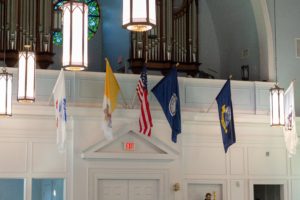
A happy Independence Day to all our American readers (and to our non-American readers who are celebrating with us)! As we spend time with our friends and families today, attend parades and watch the traditional fireworks displays, let us also take a moment to give thanks for the blessings we enjoy in the United States. This land was first consecrated by the blood of the missionaries who gave their lives that the Faith might be planted in the New World, and throughout the history of the USA, many men and women have labored, fought and died so that the home of the brave might remain the land of the free. Let us honor their sacrifices today and pray for our country, which has been under such severe spiritual attack in recent times. Prayer is certainly the most powerful weapon we can bring to such a fight, so let us beseech Our Lady, the Patroness of the United States, to defend and protect this land, and make of us a people well-pleasing to her Son.
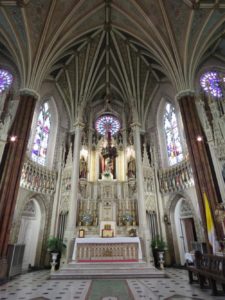
The United States has proven to be fertile ground for the work of the Fraternity, which runs 55 apostolates in 41 American dioceses, in addition to a seminary that is brimming with vocations. We have also been entrusted with the care of several extraordinary pieces of American history, such as the National Shrine of St. Alphonsus Liguori in Baltimore, where St. John Neumann, the first American bishop (the first male citizen, in fact) to be canonized, served as pastor and was consecrated the fourth Bishop of Philadelphia. We thank God today for the success He has granted to us in the United States, and ask Him to bless our future work in these abundant vineyards. +
July 4, 2019

FSSP Dallas Hosts 2nd Annual Young Adult Conference
Anyone can pull off a stunt once, but if you can do it twice, you might be on to something. Last year, Mater Dei Parish, our apostolate in Dallas, Texas, hosted a successful inaugural Southwest Region Young Adult Conference, and this year, they did it again. 65 young adults gathered at Mater Dei Parish on the weekend of June 14th – 16th, traveling from as close as Dallas itself and as far as Louisiana, Florida, Georgia, El Paso and even Wisconsin.
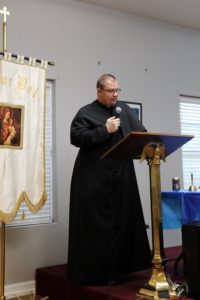
The event began on Friday night with check-in and a Rosary in the church, followed by dinner and a talk by FSSP Dallas assistant pastor Fr. Timothy O’Brien, priest-in-charge both at this and last year’s conferences. Fr. O’Brien, who spent two years working in Nigeria after he was ordained in 2015, spoke on the history of Catholicism there, particularly among the Igbo people who once possessed a strong Catholic identity, and the unfortunate effects of Westernization upon the country. An attendee of Nigerian heritage assisted Fr. O’Brien with a demonstration of the traditional greeting of a Nigerian chief, some kind of hand-slap, finger-snap routine that looked like something two baseball players might do after a good double-play!
The next day kicked off early with Mass at 8am, celebrated by Fr. James Buckley, also an assistant at Mater Dei, with opportunities for Confession before, during and after Mass. Breakfast followed, along with the second talk: Fr. John Kodet, a classmate of Fr. O’Brien’s who currently serves as the assistant down in Houston, spoke on the four levels of happiness. “The talks were really good,” said Mary, an electrical engineer from California who recently moved to Dallas and attends Mater Dei. “They were very helpful and informative.”
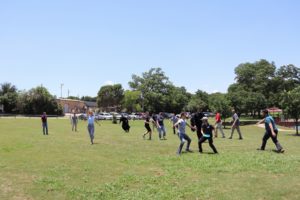
Afterwards the attendees packed a lunch and headed to nearby Fritz Park, where they listened to a talk by Mr. Cedric Cortez, an FSSP seminarian entering his sixth year, and Mr. Savio Misquita, about to start his third. Mr. Cortez, from Hawaii, and Mr. Misquita, from Goa, India, spoke on the necessity of prayer in discovering God’s will for us and the image of Himself that He wishes to see in us. The two seminarians assisted throughout the weekend with tasks ranging from handing out the paperwork involved in Friday’s icebreaker games to leading games of volleyball. The afternoon in the park seemed to be a particularly popular element among the attendees. “I liked having the time in the park,” said Mary, as it was a chance to “get to know people at our own pace.”
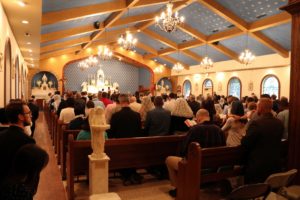
Saturday concluded with a Texas-style fajita dinner back at the parish hall, after which the tables and chairs were cleared from the main floor for the evening’s contra dance, which featured instruction from an experienced caller. On Sunday, attendees had the option of attending any Mass they chose, and many came to the 9am Solemn High celebrated by Fr. Kodet, who was assisted by Fr. O’Brien and Mr. Cortez. The 9am is an especially well-attended Mass that usually fills to standing-room only, a testimony to the impressive and continuing growth of the world’s largest FSSP apostolate that is currently served by four priests and offers five Masses on Sundays to accommodate its numbers. After Mass many attendees partook of the pancake breakfast offered by the Knights of Columbus and spent a last couple of hours chatting with one another and the seminarians before going their separate ways.
Some other attendees told us their thoughts on the event. Alex, who comes from Atlanta, Georgia and attends St. Francis de Sales, our apostolate there, is new to the Latin Mass. She found St. Francis through Google and has been attending Mass there for the past three months. When asked what she thought of the conference, she said, “I loved it. I had a lot of fun. I made new friends.” One of those friends is Marie, a student at Benedictine College in Kansas. Averse to the Latin Mass as a teenager, she has grown to love it due to the reverence and respect that she finds there. She was a bit surprised at how much she enjoyed the conference, initially expecting that it might be a little bit dull. “It was really, really great,” she said. “It was a lot better than I thought it was going to be. It was a lot more fun.”
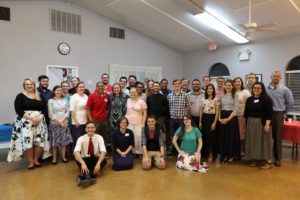
In a world where human interaction has been reduced to texts and emojis, and where being “friends” on Facebook is more often discussed than actual friendships, it is encouraging to see the success of the Southwest Region Young Adult Conference. The importance of good friendships cannot be overstated; friends who share the Faith are spiritual comrades-in-arms who encourage one another, challenge one another, help each other along the path of virtue and sanctity and keep each other out of the ravines. We all long for simpler times when people were less mobile, faith was more common and you didn’t necessarily have to look far to find those kinds of friends. But some problems come packaged with a solution. The inherent mobility of the current generation and their lightning-fast methods of communication provide an avenue of success for things like Mater Dei’s Young Adult Conference, which drew together young people from near and far for the sake of faith and friendship. +
July 2, 2019

Happy Feast of the Most Precious Blood!
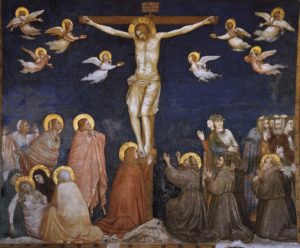
A happy and most blessed feast of the Most Precious Blood of Jesus! Only a few days ago we celebrated the feast of the Sacred Heart, which many parishes celebrated yesterday as an External Solemnity, and today’s celebration stands as a great complement to that feast. The Precious Blood of Our Lord flows from His Sacred Heart, and was poured out as a fountain of mercy and salvation for us when this Heart was pierced upon the Cross. It is this same Blood that becomes present for us upon our altars at every Mass, and incidentally, we recently commemorated the feast of Corpus Christi, the great celebration of the gift of the Eucharist. Three feast days and the most eloquent praises are insufficient to render adequate thanks for such a superabundance of gifts: the love of this Heart, the salvation won for us by this Blood, the spiritual sustenance given us by the Eucharist! “I came that they may have life, and have it abundantly,” says Our Lord in St. John’s Gospel, and certainly He spared nothing of Himself in granting us this abundance, giving Himself totally for us and for our salvation.
In addition to attending Holy Mass if you can today, we recommend taking a moment to recite the beautiful Litany of the Precious Blood. We also wish a happy patronal feast day to Most Precious Blood Parish, our apostolate in Tulsa, Oklahoma! +
The Litany of the Most Precious Blood
Lord, have mercy on us.
Christ, have mercy on us.
Lord, have mercy on us. Christ, hear us.
Christ, graciously hear us.
God, the Father of Heaven, have mercy on us.
God the Son, Redeemer of the world, have mercy on us.
God, the Holy Spirit, have mercy on us.
Holy Trinity, One God, have mercy on us.
Blood of Christ, only-begotten Son of the Eternal Father, save us. (after each line)
Blood of Christ, Incarnate Word of God,
Blood of Christ, of the New and Eternal Testament,
Blood of Christ, falling upon the earth in the Agony,
Blood of Christ, shed profusely in the Scourging,
Blood of Christ, flowing forth in the Crowning with Thorns,
Blood of Christ, poured out on the Cross,
Blood of Christ, price of our salvation,
Blood of Christ, without which there is no forgiveness,
Blood of Christ, Eucharistic drink and refreshment of souls,
Blood of Christ, stream of mercy,
Blood of Christ, victor over demons,
Blood of Christ, courage of martyrs,
Blood of Christ, strength of confessors,
Blood of Christ, bringing forth virgins,
Blood of Christ, help of those in peril,
Blood of Christ, relief of the burdened,
Blood of Christ, solace in sorrow,
Blood of Christ, hope of the penitent,
Blood of Christ, consolation of the dying,
Blood of Christ, peace and tenderness of hearts,
Blood of Christ, pledge of Eternal Life,
Blood of Christ, freeing souls from purgatory,
Blood of Christ, most worthy of all glory and honor,
Lamb of God, Who takest away the sins of the world,
Spare us, O Lord.
Lamb of God, Who takest away the sins of the world,
Graciously hear us, O Lord.
Lamb of God, Who takest away the sins of the world,
Have mercy on us.
V. Thou hast redeemed us, O Lord, in Thy Blood.
R. And made us, for our God, a kingdom.
Let us pray:
Almighty and eternal God, Thou hast appointed Thine only-begotten Son the Redeemer of the world and willed to be appeased by His Blood. Grant, we beg of Thee, that we may worthily adore this price of our salvation and through its power be safeguarded from the evils of the present life so that we may rejoice in its fruits forever in heaven. Through the same Christ our Lord. Amen.
July 1, 2019

Happy Feast of Sts. Peter and Paul!
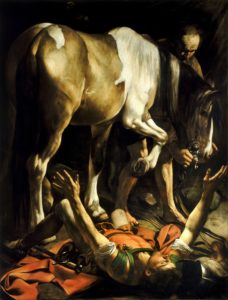
A happy and most glorious feast day of Sts. Peter and Paul! Today is a first-class feast and a patronal one for our Fraternity, named for the Prince of the Apostles. Members of the Confraternity of St. Peter can gain a plenary indulgence today under the usual conditions.
St. Peter is the rock upon which Christ built His Church, the first of those Vicars that He has put in place to keep her on firm footing as she treads the often twisted and tempestuous paths of history. St. Paul’s mission was to bring the Gospel to the Gentiles, which he was uniquely suited to do, being both a Jew and a Roman. The Acts of the Apostles and his own letters to the various churches among which he worked bear testament to the incredible extent of his journeys and labors, which would start one fateful day on the road to Damascus, take him thousands of miles through Israel, Syria, Turkey and Greece and end with his martyrdom in Rome.
The lives of both saints are parables of God’s mercy and Providence: St. Peter is almost as well-known for his denial of Christ as for his confession of Him, and St. Paul, before becoming Christianity’s most avid missionary, was first its most avid adversary. “But by the grace of God, I am what I am; and his grace in me hath not been void”, says St. Paul in his first letter to the Corinthians, proclaiming in the second letter to the same community that “power is made perfect in infirmity”. Certainly these two saints and their prayers on our behalf should give us every reason to hope that God will use our own infirmities as illustrations of His divine power, which is able to turn our frail humanity into just what He needs to accomplish His Will if we, like Sts. Peter and Paul, respond to the call.
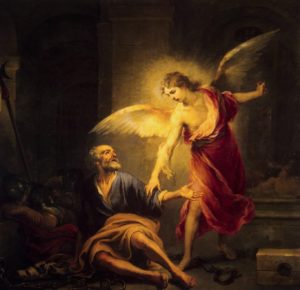
Today’s Mass is primarily concerned with the Apostle Peter, the Epistle recounting his miraculous deliverance from prison by the angel, and the Gospel his confession of Christ’s divinity. This feast is normally followed on June 30th by the Commemoration of St. Paul, a Mass more specifically dedicated to the Apostle of the Gentiles, though this year the 30th falls on a Sunday so it will be superseded by the Mass of the Sunday.
Please remember all the priests of our Fraternity in your prayers today, especially the six deacons from our Wigratzbad seminary who will be ordained to the sacred priesthood today by the Most Reverend Czesław Kozon, Bishop of Copenhagen. +
O God, Who hast made this day holy by the martyrdom of Thine Apostles Peter and Paul: grant that Thy Church may in all things follow the precepts of those through whom she received the beginnings of the Faith.
– the Collect for the feast of Sts. Peter and Paul
June 29, 2019

24th Annual Pilgrimage to Auriesville, 9/27 – 9/29
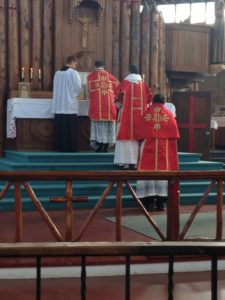
This September marks the 24th annual Pilgrimage for Restoration to the Shrine of Our Lady of Martyrs in Auriesville, New York. The sixty-two mile trek is walked over the course of three days, beginning at the shores of Lake George and concluding in Auriesville at the sites of the 17th century martyrdoms of the Jesuit Father Isaac Jogues, lay brothers Jean de Lalande and René Goupil and several Native American converts.
This year’s pilgrimage will take place Friday through Sunday, September 27th – 29th, and will be led by FSSP Allentown pastor Fr. Gregory Pendergraft and assistant pastor Fr. Joseph Favole. Visit the pilgrimage’s website for more information and to register. Pilgrims receive a discount off the registration fee if they register by June 30th. +
June 22, 2019

Fr. Luc Poirier Ordained in Ottawa
On the evening of Friday, May 31st, 2019, the Most Reverend Terrence Prendergast, Archbishop of Ottawa, conferred the sacred priesthood upon the Reverend Mr. Luc Poirier, FSSP, in a ceremony that took place at the beautiful Cathedral Basilica of Notre-Dame in Ottawa. Assisting the Archbishop at the altar were FSSP Superior General Fr. Andrzej Komorowski, North American Superior Fr. Michael Stinson, FSSP Vancouver pastor and FSSP assistant Fr. Daniel Geddes, FSSP Montréal pastor Fr. Robert Dow and Fr. Benoit Guichard from Our Lady of Guadalupe Seminary.
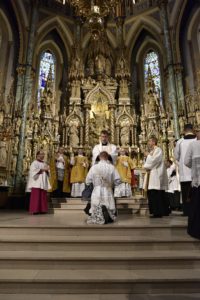
Also in attendance were three of Fr. Poirier’s four classmates who were ordained in Nebraska one week prior: Fr. John Killackey, Fr. R.J. Oballo and Fr. Daniel Powers. One of the central features of an ordination – the matter of this particular Sacrament, in fact – is the laying of the bishop’s hands upon the heads of the ordinandi, signifying the power of the priesthood that he is passing on to them. He says nothing, the prayer that constitutes the form of the Sacrament taking place a little further on. After the bishop, each of the priests present similarly lays his hands upon the heads of those about to join their ranks (see the cover photo from our post on the NE ordinations). That Friday, the laying on of hands occurred as normal, but included an unusual feature: three new priests, only a week ordained, gave this silent “ordination blessing” to their own classmate when Fr. Killackey, Fr. Oballo and Fr. Powers laid their newly-consecrated hands on the head of Fr. Poirier.
Fr. Poirier hails from the eastern province of New Brunswick, which borders our state of Maine to the west, the province of Québec to the north and the Atlantic ocean and Nova Scotia to the east. Attending the ordination were a majority of our Canada-based priests, who converged on the 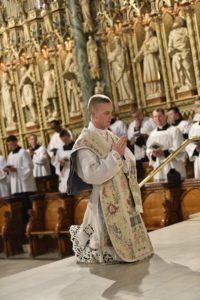 cathedral from the nearby apostolate in Ottawa, St. Clement, and the more distant but still local apostolates in Montréal and Québec City (of course, by “local” we mean local by Canadian standards: 2 hours and 4.5 hours by car, respectively). And they came from further away than that, flying clear across the country from our apostolates in Vancouver, British Columbia and Calgary, Alberta. While it is not at all a rare event for a Canadian priest to be ordained for the FSSP – we have seven apostolates north of the border and many Canadian priests and seminarians, two in this year’s class with Fr. Oballo coming from Calgary – it was nonetheless an impressive sight to see the priests, most of whom are native Canadians, turn out for the support of their countryman and of FSSP Canada more generally.
cathedral from the nearby apostolate in Ottawa, St. Clement, and the more distant but still local apostolates in Montréal and Québec City (of course, by “local” we mean local by Canadian standards: 2 hours and 4.5 hours by car, respectively). And they came from further away than that, flying clear across the country from our apostolates in Vancouver, British Columbia and Calgary, Alberta. While it is not at all a rare event for a Canadian priest to be ordained for the FSSP – we have seven apostolates north of the border and many Canadian priests and seminarians, two in this year’s class with Fr. Oballo coming from Calgary – it was nonetheless an impressive sight to see the priests, most of whom are native Canadians, turn out for the support of their countryman and of FSSP Canada more generally.
Just as the priests in attendance represented the various regions where we work in Canada, they represented the linguistic variety to be found in that country as well. Although Ottawa is a decidedly bilingual area where knowledge of French is not a necessity, it seemed that French was the language of choice of many of the priests and faithful in attendance, and the music of it was 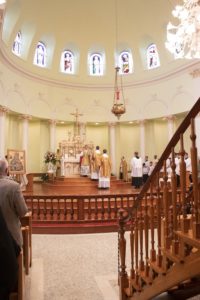 heard regularly throughout the course of the weekend’s activities. Fr. Poirier’s own French-speaking roots will certainly serve him well when he begins his first assignment in the predominantly francophone city of Montréal in July.
heard regularly throughout the course of the weekend’s activities. Fr. Poirier’s own French-speaking roots will certainly serve him well when he begins his first assignment in the predominantly francophone city of Montréal in July.
On Saturday morning at St. Clement, Fr. Poirier celebrated his first Mass, a Solemn High at which Fr. Killackey and Fr. Powers assisted as deacon and subdeacon. Afterwards Fr. Poirier and Fr. Powers bestowed their first blessings on the many faithful there, and if you received a blessing from Fr. Poirier, you were the fortunate recipient of not one but two ordination cards – one in English and one en français! +
June 18, 2019

Ask Father: June 2019
Why do many prayers mention being in the “shadow of God’s wings”? God has no wings, He is God. – George from Wisconsin
Dear George,
The best questions come with their own answers attached. It is true that God is… well, God, and therefore transcends everything we can imagine. The Triune God does not have wings—true. Unfortunately for us mere humans we must think through sensible things, and therefore metaphor is required for us to describe the Divine nature and God’s activity in governing His creation. Artistry must employ things that are, at one time, both accessible to us and point to the inaccessible. Pseudo-Dionysius gives a beautiful description of this process: “We now grasp these things in the best way we can, and as they come to us, wrapped in the sacred veils of that love toward humanity with which scripture and hierarchical traditions (i.e. liturgy) cover the truths of the mind with things derived from the realm of the senses.” Scripture, with the written word, and Liturgy, with its various symbols, are veils trying to give a glimpse—in a human way—to a Divine reality. The Council of Trent also acknowledged this reality in its 22nd session: “Such is the nature of man, that, without external helps, he cannot be easily upraised to the meditation of divine things.”
If one wanted to deny the use of physical images applied to God, why stop at wings? God does not have ears, nose, hands or even feet and yet the psalmist cries, “Incline thy ear unto me” (Psalm 16:6), upon Noah offering a smoky sacrifice “the Lord smelled a sweet savor” (Genesis 8:21), a reflecting Isaiah says, “You [God] are our potter, we are all the work of Your hand” (Isaiah 64:8), and when the first parents sinned they hid themselves from God because “they heard the voice of the Lord God walking in paradise” (Genesis 3:8). In truth, if one wanted to deny images applied to God (a truly gross iconoclasm) one would be left with very little… actually nothing. The Triune God transcends the physical world and our imagination remains grounded in it—only metaphor can form a bridge between the two until the end of our earthly sojourn when we will see God “face to face” (1 Corinthians 13:12).
The above answer should suffice as a reply to the unspoken question underlying your own answer, “God has no wings, He is God.” But what of your first question? What are God’s wings?
The contemporary American imagination has been formed through the popular song On Eagles’ Wings (based on Psalm 90), which uses Exodus 19:4 and Deuteronomy 32:11 to define the metaphor “I have carried you upon the wings of eagles.” In other places eagle wings are also used as an image for swiftness and endurance (Isaiah 40:31), but these citations portray a different image than our expression; they describe having wings or riding upon them, whereas we are trying to understand what is meant by being “underneath His wings,” and again our expression doesn’t really identify the wing type. St. Augustine shies away from eagles’ wings and chooses a more domestic image: “The hen defends her chickens beneath her wings; how much more shalt thou be safe beneath the wings of God,” clearly using Christ’s metaphor recorded in Matthew 23:37 (Luke 13:34-35) as his inspiration.
I offer another possible interpretation which in fact is not a metaphor, but a specific location and an architectural feature. The phrase “shadow of thy wings” and its twin “covert[1] of thy wings” are only used in the Book of Psalms, respectively Psalms 16:8, 52:2, 90:4 and 35:8, 60:5, 62:8.
Within the context of most of these psalms an actual location for the psalmist’s prayer comes to light. Psalm 35 refers to the “plenty of thy [God’s] house” (v.9). Psalm 16 refers to appearing in God’s “sight and glory” (v.15). Psalm 56 refers to God’s “glory” being lifted up (vs.6 and 12). Psalm 60, “in thy tabernacle I shall dwell forever” (v.5). Psalm 90 refers to having confidence under God’s wings which “overshadow” from above and later refers to angels providing protection overhead (v.11). Finally, Psalm 62 ties many of these terms together: “in the sanctuary have I
come before thee, to see thy power and thy glory” (v.3).
I would suggest that the wings are those of angels, specifically the cherubim which adorned the ark, or the cherubim built later by Solomon which overshadowed the entire Holy of Holies. Solomon “set the cherubim in the midst of the inner temple and the cherubim stretched forth their wings” (3 Kings 6:27) and “the priests brought in the ark of the covenant of the Lord into its place, into the oracle of the temple, into the Holy of Holies, under the wings of the cherubim” (3 Kings 8:6). To be under His wings is to reside inside the inner sanctum of the temple. It was the closest one could be to God on earth in the Old Testament; the nearest parallel in the new covenant would be the faithful at the communion rail, devoutly kneeling in the true substantial presence of the Lord. May we always remain under His wings. +
Answered by:
Fr. Dominic Savoie, Assistant Pastor, FSSP Sacramento
- covered in the sense of sheltered or veiled (i.e. secret).
June 15, 2019


